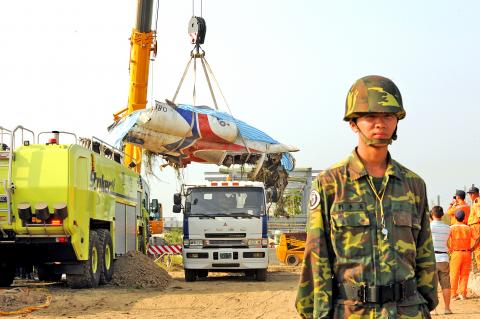The pilot of a 37-year-old AT-3 training aircraft belonging to the Air Force Academy died yesterday after his aircraft collided with another AT-3 and crashed during a routine training mission of the Thunder Tiger Aerobatics Team in Greater Kaohsiung, military officials said.
The pilot, Lieutenant Colonel Chuang Pei-yuan (莊倍源), tried to parachute to safety before the plane crashed in a field in Greater Kaohsiung’s Zihguan District (梓官), but he ejected from the plane at too low an altitude and his parachute never fully opened, the air force said.
Chuang sustained serious injuries after falling to the ground and was rushed to the Gangshan Branch of the Armed Forces Kaohsiung General Hospital, the Ministry of National Defense said.

Photo: Chang Chung-i, Taipei Times
Doctors at the hospital tried to revive the 37-year-old, but to no avail, it added.
The crash occurred at about 11:17am yesterday after Chuang’s jet collided with another AT-3 flown by Lieutenant Colonel Yang Chih-ping (楊志平), which was not badly damaged and landed safely at the Air Force Academy in Greater Kaohsiung.
In video clips obtained by the Chinese-langauge Liberty Times (the Taipei Times’ sister paper) and posted on its Web site shortly after noon yesterday, three AT-3s are seen flying in formation at high velocity and trailing white smoke.
Chuang’s AT-3 then accidentally clips another aircraft in a cross-over run. It first climbs higher, but begins to spin out of control and heads toward the ground at an incline.
Another video showed the two AT-3 planes make contact in mid-air, with the leading plane’s tail breaking off, then flying erratically before crashing.
The sounds of nearby bystander witnesses were also recorded, shouting: “There is a collision, the plane is going to crash,” “Oh, no, it’s going out of control” and “Get out quick, jump out with the parachute.”
Both Chuang and Yang are senior pilots who have clocked more than 2,000 flight hours, Air Force Academy superintendent Chang Yan-ting (張延廷) said at a news conference.
The two had been partners for about two years and participated in the formation of seven AT-3 jet trainers flown by the Thunder Tiger Aerobatics Team that streaked over the Presidential Office as part of Double Ten National Day celebrations on Oct. 10 this year, Chang said.
The Air Force Command Headquarters has set up a task force to probe the cause of the crash. There have been 12 crashes involving AT-3 training aircraft since 1990, resulting in the death of seven pilots.
An air force official said that Chuang missed the opportunity to eject from his aircraft at a higher altitude because he was trying to maneuver his aircraft clear of residential communities and crowds.
Chuang would have been able to save his life if he had bailed from the aircraft earlier, the official said, but he did not want to endanger the lives of others.
“This showed the pilot’s great virtue,” the official said.
Following the crash yesterday, legislators asked the Ministry of National Defense about plans to phase out the aging AT-3 aircraft, which have been in service for more than 25 years.

DAREDEVIL: Honnold said it had always been a dream of his to climb Taipei 101, while a Netflix producer said the skyscraper was ‘a real icon of this country’ US climber Alex Honnold yesterday took on Taiwan’s tallest building, becoming the first person to scale Taipei 101 without a rope, harness or safety net. Hundreds of spectators gathered at the base of the 101-story skyscraper to watch Honnold, 40, embark on his daredevil feat, which was also broadcast live on Netflix. Dressed in a red T-shirt and yellow custom-made climbing shoes, Honnold swiftly moved up the southeast face of the glass and steel building. At one point, he stepped onto a platform midway up to wave down at fans and onlookers who were taking photos. People watching from inside

A Vietnamese migrant worker yesterday won NT$12 million (US$379,627) on a Lunar New Year scratch card in Kaohsiung as part of Taiwan Lottery Co’s (台灣彩券) “NT$12 Million Grand Fortune” (1200萬大吉利) game. The man was the first top-prize winner of the new game launched on Jan. 6 to mark the Lunar New Year. Three Vietnamese migrant workers visited a Taiwan Lottery shop on Xinyue Street in Kaohsiung’s Gangshan District (崗山), a store representative said. The player bought multiple tickets and, after winning nothing, held the final lottery ticket in one hand and rubbed the store’s statue of the Maitreya Buddha’s belly with the other,

‘NATO-PLUS’: ‘Our strategic partners in the Indo-Pacific are facing increasing aggression by the Chinese Communist Party,’ US Representative Rob Wittman said The US House of Representatives on Monday released its version of the Consolidated Appropriations Act, which includes US$1.15 billion to support security cooperation with Taiwan. The omnibus act, covering US$1.2 trillion of spending, allocates US$1 billion for the Taiwan Security Cooperation Initiative, as well as US$150 million for the replacement of defense articles and reimbursement of defense services provided to Taiwan. The fund allocations were based on the US National Defense Authorization Act for fiscal 2026 that was passed by the US Congress last month and authorized up to US$1 billion to the US Defense Security Cooperation Agency in support of the

‘COMMITTED TO DETERRENCE’: Washington would stand by its allies, but it can only help as much as countries help themselves, Raymond Greene said The US is committed to deterrence in the first island chain, but it should not bear the burden alone, as “freedom is not free,” American Institute in Taiwan Director Raymond Greene said in a speech at the Institute for National Defense and Security Research’s “Strengthening Resilience: Defense as the Engine of Development” seminar in Taipei yesterday. In the speech, titled “Investing Together and a Secure and Prosperous Future,” Greene highlighted the contributions of US President Donald Trump’s administration to Taiwan’s defense efforts, including the establishment of supply chains for drones and autonomous systems, offers of security assistance and the expansion of